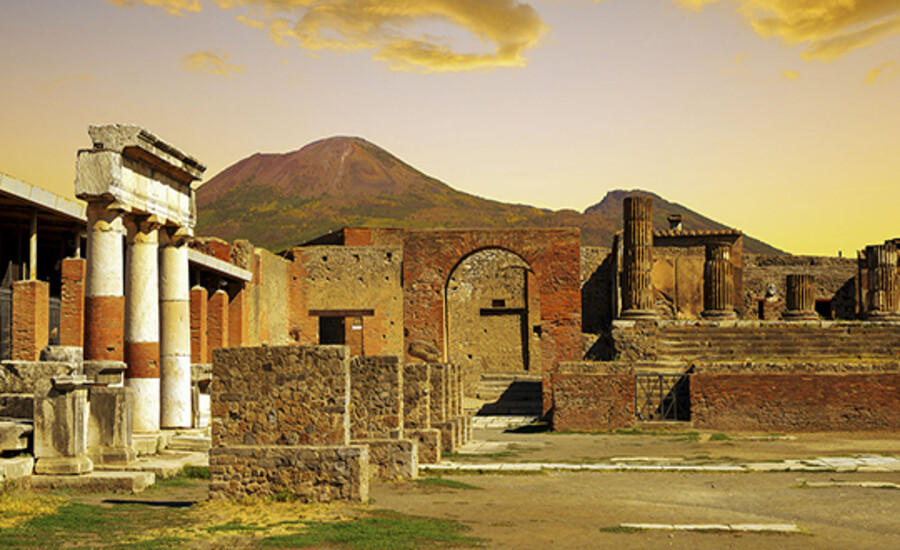
ISTOCK.COM/VENCAVOLRAB
Thoughts From A Dead City
Pompeii is one of the most amazing archaeological sites I’ve ever visited. About 10,000 people lived there until a volcanic eruption in a.d . 79 destroyed the whole town. Today, it’s incredibly well preserved. You can walk down streets and wander through houses that have been empty for nearly 2,000 years. The history of Pompeii and Rome opens a window to a past that is both strangely alien and strikingly familiar.
Parts of Pompeii feel familiar. The amphitheater held 20,000 sports fans, who bought food at streetside fast-food stands and who supported their sides so passionately that fights sometimes broke out between opposing spectators.
Then you remember what “sport” they were watching. This structure, the oldest known Roman building of its kind, was built for fans to watch slaves fight each other to the death.
Exhibits of family life from Pompeii show familiar scenes: husband and wife nervously posing for a picture, brothers doing homework, guests arriving for dinner. Other aspects of Roman family life are abhorrent: A child didn’t count as human until he or she was accepted by his father. A rejected child had no legal rights and would be left to die of exposure on a rubbish dump.
The Roman world had an advanced economy, high-rise apartment blocks, sprawling cities. It also had slavery: Perhaps two out of every five people in first-century Italy were enslaved.
The Romans were people like us, with similar hopes, fears, pleasures and human nature. Yet these people, so similar to us, committed appalling evils and thought them normal.
Yet the Romans considered other societies barbaric. Surely they conversed about the abominable child sacrifices of some Eastern religion as they strolled past the rubbish dump on the way to the gladiator deathmatch.
From the outside, we clearly see some horrors for what they are. But looking at life around us, we see everything as normal. The Romans didn’t recognize their own evils. Neither do we.
Our societies regard it as normal, even good, to reach into the womb with crushing instruments and vacuums to kill millions of babies, usually because they are “inconvenient.” Romans allowed the murder of babies, but archaeological evidence indicates they rarely exercised that “right.” You can’t say the same about us today.
Slavery may be outlawed, but Western businesses and governments bend over backward to appease the Chinese government, which has around a million people locked in concentration camps and treats many of its own people poorly, to put it mildly.
I’m sure there are things I regard as unpleasant or bad, yet still “normal.” I’m sure I don’t fully recognize the evil as clearly as I would with an outside perspective.
“Today we are lost in the present—rejecting the past and blind to the future!” wrote Trumpet editor in chief Gerald Flurry in the July 1998 Trumpet. “We have lost the big overview.”
Jeremiah 17:9 tells us that the human heart “is deceitful above all things, and desperately wicked.” Herbert W. Armstrong wrote, “Human nature wants to be good—to consider itself and be considered good, while it wants only to do evil” (The United States and Britain in Prophecy). This is exactly what happens when you’re lost in the present. You judge societies by your own current standards, and therefore today’s society always compares favorably. It gives the illusion of the past as barbaric evil and the present as perpetually progressive.
But get to know people from the past, and you see that they were just like us. They committed appalling evils while considering themselves good. If you have even a whiff of humility, you have to ask yourself, are we not doing the same thing?
For a society to refuse to confront its evils is deadly. Yet no society wants to. When first-century Christians declared that society was evil, they were publicly murdered in the same amphitheaters where the gladiators died. Today, nothing will get you denounced more viciously than to suggest that we are sinners.
Our belief that we are much more sophisticated than those who have gone before us blinds us to all lessons from history. What can such inferior barbarians teach us, after all? Our ignorance of history makes us arrogant. And our arrogance keeps us ignorant.
Our failure to see the evil in our own hearts and minds is “the number one problem of humanity today,” Mr. Flurry writes in Jeremiah and the Greatest Vision in the Bible. Understanding the truth about Jeremiah 17:9 and the evil of the human heart is “more important than any education in this world. When we understand it, radical action is necessary.”
We are no more righteous than the people of Pompeii. Our arrogance just illuminates their sins more brightly than our own. The truth is, we have similarly serious flaws. As a society, and as individuals, we must take radical actions to fix them.
